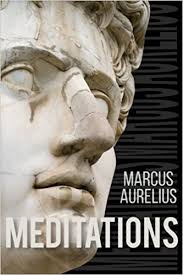Meditations Page #5
Meditations is a series of personal writings by Marcus Aurelius, Roman Emperor from 161 to 180 AD, recording his private notes to himself and ideas on Stoic philosophy. Marcus Aurelius wrote the 12 books of the Meditations in Koine Greek as a source for his own guidance and self-improvement.
By the irony of fate this man, so gentle and good, so desirous of quiet joys and a mind free from care, was set at the head of the Roman Empire when great dangers threatened from east and west. For several years he himself commanded his armies in chief. In camp before the Quadi he dates the first book of his Meditations, and shows how he could retire within himself amid the coarse clangour of arms. The pomps and glories which he despised were all his; what to most men is an ambition or a dream, to him was a round of weary tasks which nothing but the stern sense of duty could carry him through. And he did his work well. His wars were slow and tedious, but successful. With a statesman's wisdom he foresaw the danger to Rome of the barbarian hordes from the north, and took measures to meet it. As it was, his settlement gave two centuries of respite to the Roman Empire; had he fulfilled the plan of pushing the imperial frontiers to the Elbe, which seems to have been in his mind, much more might have been accomplished. But death cut short his designs. Truly a rare opportunity was given to Marcus Aurelius of showing what the mind can do in despite of circumstances. Most peaceful of warriors, a magnificent monarch whose ideal was quiet happiness in home life, bent to obscurity yet born to greatness, the loving father of children who died young or turned out hateful, his life was one paradox. That nothing might lack, it was in camp before the face of the enemy that he passed away and went to his own place. Translations THE following is a list of the chief English translations of Marcus Aurelius: (1) By Meric Casaubon, 1634; (2) Jeremy Collier, 1701; (3) James Thomson, 1747; (4) R. Graves, 1792; (5) H. McCormac, 1844; (6) George Long, 1862; (7) G. H. Rendall, 1898; and (8) J. Jackson, 1906. Renan's "Marc-Aurèle"--in his "History of the Origins of Christianity," which appeared in 1882--is the most vital and original book to be had relating to the time of Marcus Aurelius. Pater's "Marius the Epicurean" forms another outside commentary, which is of service in the imaginative attempt to create again the period. MARCUS AURELIUS ANTONINUS THE ROMAN EMPEROR HIS FIRST BOOK concerning HIMSELF: Wherein Antoninus recordeth, What and of whom, whether Parents, Friends, or Masters; by their good examples, or good advice and counsel, he had learned: Divided into Numbers or Sections. ANTONINUS Book vi. Num. xlviii. Whensoever thou wilt rejoice thyself, think and meditate upon those good parts and especial gifts, which thou hast observed in any of them that live with thee: as industry in one, in another modesty, in another bountifulness, in another some other thing. For nothing can so much rejoice thee, as the resemblances and parallels of several virtues, eminent in the dispositions of them that live with thee, especially when all at once, as it were, they represent themselves unto thee. See therefore, that thou have them always in a readiness. THE FIRST BOOK I. Of my grandfather Verus I have learned to be gentle and meek, and to refrain from all anger and passion. From the fame and memory of him that begot me I have learned both shamefastness and manlike behaviour. Of my mother I have learned to be religious, and bountiful; and to forbear, not only to do, but to intend any evil; to content myself with a spare diet, and to fly all such excess as is incidental to great wealth. Of my great-grandfather, both to frequent public schools and auditories, and to get me good and able teachers at home; and that I ought not to think much, if upon such occasions, I were at excessive charges. II. Of him that brought me up, not to be fondly addicted to either of the two great factions of the coursers in the circus, called Prasini, and Veneti: nor in the amphitheatre partially to favour any of the gladiators, or fencers, as either the Parmularii, or the Secutores. Moreover, to endure labour; nor to need many things; when I have anything to do, to do it myself rather than by others; not to meddle with many businesses; and not easily to admit of any slander. III. Of Diognetus, not to busy myself about vain things, and not easily to believe those things, which are commonly spoken, by such as take upon them to work wonders, and by sorcerers, or prestidigitators, and impostors; concerning the power of charms, and their driving out of demons, or evil spirits; and the like. Not to keep quails for the game; nor to be mad after such things. Not to be offended with other men's liberty of speech, and to apply myself unto philosophy. Him also I must thank, that ever I heard first Bacchius, then Tandasis and Marcianus, and that I did write dialogues in my youth; and that I took liking to the philosophers' little couch and skins, and such other things, which by the Grecian discipline are proper to those who profess philosophy. IV. To Rusticus I am beholding, that I first entered into the conceit that my life wanted some redress and cure. And then, that I did not fall into the ambition of ordinary sophists, either to write tracts concerning the common theorems, or to exhort men unto virtue and the study of philosophy by public orations; as also that I never by way of ostentation did affect to show myself an active able man, for any kind of bodily exercises. And that I gave over the study of rhetoric and poetry, and of elegant neat language. That I did not use to walk about the house in my long robe, nor to do any such things. Moreover I learned of him to write letters without any affectation, or curiosity; such as that was, which by him was written to my mother from Sinuessa: and to be easy and ready to be reconciled, and well pleased again with them that had offended me, as soon as any of them would be content to seek unto me again. To read with diligence; not to rest satisfied with a light and superficial knowledge, nor quickly to assent to things commonly spoken of: whom also I must thank that ever I lighted upon Epictetus his Hypomnemata, or moral commentaries and common-factions: which also he gave me of his own. V. From Apollonius, true liberty, and unvariable steadfastness, and not to regard anything at all, though never so little, but right and reason: and always, whether in the sharpest pains, or after the loss of a child, or in long diseases, to be still the same man; who also was a present and visible example unto me, that it was possible for the same man to be both vehement and remiss: a man not subject to be vexed, and offended with the incapacity of his scholars and auditors in his lectures and expositions; and a true pattern of a man who of all his good gifts and faculties, least esteemed in himself, that his excellent skill and ability to teach and persuade others the common theorems and maxims of the Stoic philosophy. Of him also I learned how to receive favours and kindnesses (as commonly they are accounted:) from friends, so that I might not become obnoxious unto them, for them, nor more yielding upon occasion, than in right I ought; and yet so that I should not pass them neither, as an unsensible and unthankful man.
Translation
Translate and read this book in other languages:
Select another language:
- - Select -
- 简体中文 (Chinese - Simplified)
- 繁體中文 (Chinese - Traditional)
- Español (Spanish)
- Esperanto (Esperanto)
- 日本語 (Japanese)
- Português (Portuguese)
- Deutsch (German)
- العربية (Arabic)
- Français (French)
- Русский (Russian)
- ಕನ್ನಡ (Kannada)
- 한국어 (Korean)
- עברית (Hebrew)
- Gaeilge (Irish)
- Українська (Ukrainian)
- اردو (Urdu)
- Magyar (Hungarian)
- मानक हिन्दी (Hindi)
- Indonesia (Indonesian)
- Italiano (Italian)
- தமிழ் (Tamil)
- Türkçe (Turkish)
- తెలుగు (Telugu)
- ภาษาไทย (Thai)
- Tiếng Việt (Vietnamese)
- Čeština (Czech)
- Polski (Polish)
- Bahasa Indonesia (Indonesian)
- Românește (Romanian)
- Nederlands (Dutch)
- Ελληνικά (Greek)
- Latinum (Latin)
- Svenska (Swedish)
- Dansk (Danish)
- Suomi (Finnish)
- فارسی (Persian)
- ייִדיש (Yiddish)
- հայերեն (Armenian)
- Norsk (Norwegian)
- English (English)
Citation
Use the citation below to add this book to your bibliography:
Style:MLAChicagoAPA
"Meditations Books." Literature.com. STANDS4 LLC, 2025. Web. 23 Feb. 2025. <https://www.literature.com/book/meditations_76>.








Discuss this Meditations book with the community:
Report Comment
We're doing our best to make sure our content is useful, accurate and safe.
If by any chance you spot an inappropriate comment while navigating through our website please use this form to let us know, and we'll take care of it shortly.
Attachment
You need to be logged in to favorite.
Log In